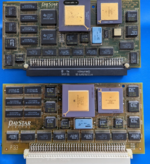ObeyDaleks
Well-known member
MacBench scores accelerator cards way lower than the others. It seems to be affected by bus speed more.
View attachment 58195
View attachment 58196
View attachment 58197
Ahh that's interesting. My results were very similar to your screenshots. So it stands to reason that Macbench will produce similarly low scores in my case as well. I might try it anyway out of curiosity (although swapping cards and extensions is a bit of a pain hehe).
So I heard (somewhere) that Macbench is considered a more "complete" benchmark as compared to Speedometer and Norton. But if Macbench indeed favors bus over cache, is it, in all actuality, a misleading benchmark, at least when it comes to accelerators? Onboard cache was touted as a big contributor to the performance gains for accelerators of this era. The idea was that in most applications, the most frequently reused portion of the memory stack was fairly small and therefore would fit into cache. This is actually true even today and it is a known fact that CPUs with large cache will often outperform faster CPUs with smaller amount of cache (AMD Ryzen X3D series being a prime example). So, if Macbench is somehow neglecting to test those scenarios (perhaps by randomizing memory allocations), is it really a good benchmark, at least when it comes to measuring real-world performance? Just a theory.
Last edited:

